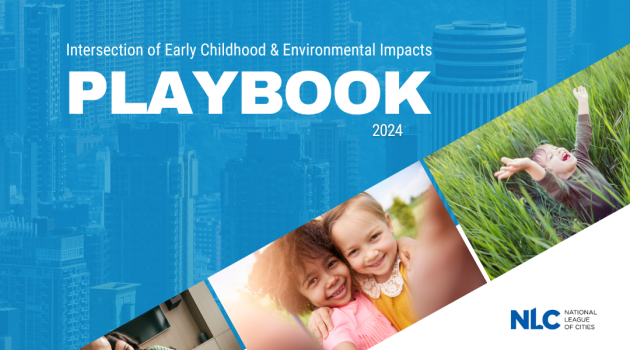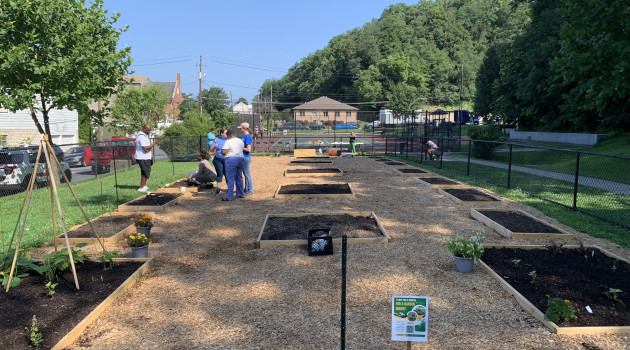
The extraction and production of materials emits massive amounts of greenhouse gasses, the main driver of climate change, and the accumulation of waste and pollution from these materials can poison people and the environment and worsen climate change. The impacts of both pollution and climate change disproportionately harm communities facing inequities. To make matters worse, products municipalities purchase and use can have significant impacts on the health of their employees and the communities they serve.
Sustainable purchasing by local governments, universities, hospitals, and other institutions is crucial to the health of humans and the planet. Together, they spend about $2.5 trillion every year on procurement — municipalities alone spend nearly $1.6 trillion. All of those products and services have an enormous footprint!
Bottom line — Procurement is not neutral. It can determine the health and safety of the environment and our communities. Buying safe and sustainable products increases demand for these products and ultimately increases their market share. Procurement is an important, innovative tool for achieving an equitable, healthy, and climate-friendly future.
WHAT’S HAPPENING IN THE GREAT LAKES REGION?
The Ecology Center formed the Great Lakes Climate Adaptation Network (GLCAN) Procurement Workgroup to support regional sustainability and procurement professionals as they work towards more socially- and environmentally-conscious purchasing practices. This Workgroup was supported by a generous grant awarded to the City of Holland Michigan by Healthy Babies Bright Futures (HBBF).
Dan Broersma, Sustainability Manager for the City of Holland, and Lori Welch, Sustainability Manager for the City of Lansing, and staff from other cities, counties, and institutions in the region participate in the Workgroup to advance sustainable procurement efforts. Broersma, Welch, and the other Workgroup participants have been partners with the Ecology Center in developing tools to help municipalities and institutions meet their sustainable procurement goals.
Workgroup members share their needs with Ecology Center staff who then develop or curate supporting resources. We created a self-assessment survey to gauge where cities are in their sustainable procurement journey and where they could use assistance. Through that assessment, we learned:
- The biggest drivers motivating action on procurement were other sustainability policies, plans, or commitments (e.g., climate adaptation plans or sustainability plans) and risk reduction requirements.
- Most staff had not been trained on sustainable procurement strategy, policy, procedures, and tools.
- In most cases, sustainability was not yet embedded in procurement standard operating procedures.
- Most respondents did not use indicators to measure performance in sustainable procurement.
WHAT TOOLS CAN MY CITY USE?
Our team created tools to help participants address gaps and reach procurement goals. Tools developed include:
- a model sustainable purchasing policy;
- a modular powerpoint presentation to introduce stakeholders to the “why” and “how” of sustainable procurement;
- an extensive directory of sustainable purchasing materials for more than a dozen major product categories; and
- a collection of fact sheets.
All of these materials are available online to download and tailor on the Purchasing for Safer Cities section of our website to best fit any city’s needs.
MORE ABOUT LANSING’S SUSTAINABLE PROCUREMENT POLICY
During the grant period, the City of Lansing adopted a sustainable procurement policy based on the model policy. The policy is available to use as is, or it can be tailored for use by other municipalities.
Their next step is to implement the policy including developing specific contracting language to be used in upcoming contracts. Throughout this grant period, Lansing sustainability and procurement staff dedicated time to regular meetings to review and provide feedback on materials produced for the Workgroup. Using a small amount of end-of-year funding, Lansing contracted with us to begin implementation of their procurement policy. Recently, Lansing was awarded a $25,000 grant from HBBF to more comprehensively implement this new sustainable procurement policy. We are excited to continue this work with Lansing and create more tools that are accessible and useful to other municipalities!
EXAMPLES FROM DAYTON, THE UNIVERSITY OF MICHIGAN, HOLLAND + MORE
The City of Dayton, OH, is moving forward with their sustainable purchasing policy efforts. The Office of Sustainability and purchasing staff are working together on two preliminary efforts: adding language promoting sustainable purchasing to their standard RFP template; and adding sustainable purchasing language to an upcoming furniture bid.
The University of Michigan has committed to greening their furniture and janitorial contracts, spurred by GLCAN Workgroup efforts and using materials developed for the Workgroup.
The City of Holland, MI, will meet with their finance team in the near future and leverage the materials developed for the Workgroup to advance their sustainable purchasing efforts.
The Ecology Center shared these materials and efforts with other procurement groups. The Harvard Kennedy School Government Performance Lab leads the Procurement Excellence Network (PEN) with 700 members. In Spring 2023, Ecology Center staff met with PEN to discuss adding sustainable purchasing practices to their work and later led a presentation about sustainable purchasing materials and the Workgroup’s efforts to PEN participants.
HOW TO MAKE THE CASE FOR SUSTAINABLE PROCUREMENT IN YOUR CITY
To help sustainability and purchasing staff make the case for sustainable purchasing to decision-makers (such as mayors, councils, and administrators), we developed a modular powerpoint presentation. The presentation provides all the critical information about sustainable purchasing and allows users to pick and choose which compelling arguments are most salient for their audience or most relevant to their program. The presentation was created through an iterative process in which Workgroup participants reviewed an early draft and provided feedback to improve the final version. The final slide deck was shared with Workgroup members in July and is available on our website.
TOOLS TO NAVIGATE PROCUREMENT INFORMATION
We also created a Directory of Sustainable Purchasing to help staff navigate the wealth of information about sustainable purchasing as they implement their policies. The Directory offers guidance for setting goals and metrics for sustainable purchasing programs, as well as resources and case studies for product categories ranging from building materials to office supplies.
We’ve also developed a collection of fact sheets on topics of particular interest to the group. General fact sheets include PFAS-free purchasing, third-party certifications and eco-labels, how sustainable purchasing saves money, and less toxic purchasing. Recently, we surveyed Workgroup participants to identify product categories of interest for a new series of fact sheets. With that feedback, we identified nine categories of high volume, high impact products to feature in this series, called Sustainable Purchasing Quick Guides. These Quick Guides highlight the potential hazards associated with the products, examples of municipalities adopting healthier solutions, associated benefits, and tools and resources. The Quick Guide series is available on our website.
Together, the GLCAN Workgroup has significantly advanced sustainable procurement in the region, with grant support from HBBF’s Bright Cities Program. We look forward to continuing to support equitable, non-toxic, and climate-friendly procurement in the Great Lakes region and beyond!


